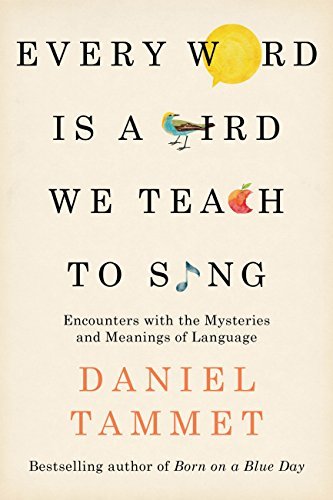What do you think?
Rate this book


'Tammet's intriguing cases of linguistic idiosyncrasies expand our notions on what it means to be human . . . Would dazzle any storyteller in love with words and their deepest meanings' (Amy Tan)
'A generous book and a beguiling read' (Rebecca Gowers)
From the bestselling author of Born on a Blue Day and Thinking in Numbers, a delightful and eclectic exploration of language, and what it can teach us about ourselves and our lives.
Why is the name 'Cleopatra' not allowed in Iceland? Why do clocks 'talk' to the Nahua people of Mexico? And if we are what we eat, are we also what we say? These are just some of the questions Daniel Tammet answers in Every Word is a Bird We Teach to Sing, a mesmerising new collection of essays investigating the intricacies and profound power of human language.
Tammet goes back in time to explore the numeric language of his autistic childhood; he looks at the music and patterns that words make, and how languages evolve and are translated. He meets one of the world's most accomplished lip readers in Canada, learns how endangered languages like Manx are being revived and corresponds with native speakers of Esperanto in their mother tongue. He studies the grammar of the telephone, contemplates the significance of disappearing dialects, and also asks: will chatbots ever manage to convince us that they are human?
From the art of translation to the lyricism of sign language, Every Word is a Bird We Teach to Sing is a fascinating journey through the world of words, letters, stories and meanings, and an extraordinary testament to the stunning range of Tammet's literary and polyglot talents.
288 pages, Kindle Edition
First published September 12, 2017
You are what you say – well, maybe, up to a point. Every voice carries certain personality traits – the tongue-tiedness of one; of another, the overreaching vowels. Every voice, in preferring dinner to supper, or in pronouncing this as dis, betrays traces of its past. But vocabulary is not destiny. Words, regardless of their pedigree, make only as much sense as we choose to give them. We are the teachers, not they. To possess fluency, or “verbal intelligence,” is to animate words with our imagination. Every word is a bird we teach to sing.
As I gathered momentum, acquired rhythm, I sensed the men and women lean forward, alert and rapt. With each pronounced digit their concentration redoubled and silenced competing thoughts. Meditative smiles broadened faces. Some in the audience were even moved to tears. In those numbers I had found the words to express my deepest emotions. In my person, through my breath and body, the numbers spoke to the motley attendees on that bright March morning and afternoon.
Mexico City (then Tenochtitlán) was always booming , ringing, resounding in the days of Montezuma's glory. The wind whistled, the Aztecs – with flutes and ocarinas – whistled; to the tinkling of a rain shower they added the tinkling of their bracelets, anklets, ceramic pendants and beads; after a night ablare with thunder, a morning of horns and conches, copper gongs and tortoiseshell drums. Singers in iridescent feathers roared like jaguars, squawked like eagles, cooed like quetzals. Mellifluous orations, “flower songs”, offered the listener color and beauty, and could inspire and pacify.
Humans in conversation, he concludes, update and modify social reality from moment to moment. Meanings are broached, negotiated, tussled over. Big things are at stake. Computers, on the other hand, inert and indifferent, “can't care less” about meaning. It is this can't-care-less-ness that will forever keep them imitating people's words.
I care about the philosopher's words. They can change me, and I let them. When I turn off my laptop it feels warm. I notice that. Not the warm of a friend's hug or handshake; only of electricity, I think. But without it, how much less of the world's meaning would our brains transform, convert?